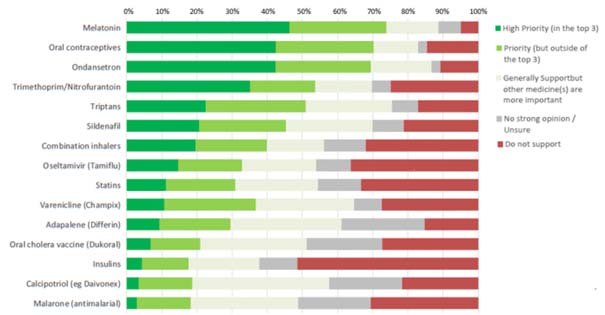Introducing Schedule 3-and-a-bit
By Antony Scholefield, Australian Doctor
The TGA has effectively created a new drug scheduling category for controlled OTC medicines as part of a plan to make more medicines available without a prescription.
Pharmacy lobby groups have already provided a list of suggested downscheduling targets, including trimethoprim and statins.
The TGA says the new subcategory — Schedule 3, Appendix M — has already been added to the scheduling handbook, but it is launching a consultation on what specific controls should be available to protect the public from harm.
For individual drugs listed in the new appendix, pharmacists may have to undergo further training before being allowed to dispense them.
There could also be limits on quantities or requirements to tell the patient’s regular GP before supplying the medications.
The consultation paper stresses that the controls would not be routinely required for medicines that are rescheduled from S4 to S3, but only in circumstances where “doubt might otherwise exist as to the public health benefit of doing so”.
The TGA says this new focus on downscheduling is to help “facilitate better access to medicines and support appropriate self-care”.
It comes more than a year after the Pharmacy Guild of Australia’s unsuccessful campaign to prevent codeine being completely rescheduled as a Schedule 4 drug.
One of the key ideas pitched to the Federal Government at the time was a ‘prescription except when’ scheduling category, which would allow pharmacists to sell codeine for acute pain if they were using a real-time monitoring system.
The TGA, in describing its new plan, said it expected real-time reporting to be a requirement only in rare cases under Appendix M, if ever.
In December last year, the watchdog asked the Pharmaceutical Society of Australia to draw up a list of S4 drugs that might be downscheduled.
Based on a survey of its members, the society came up with a list of seven ‘high priority’ prescription medicines: melatonin, oral contraceptives, ondansetron, trimethoprim/nitrofurantoin, triptans, sildenafil and adapalene.
More than half of the 211 respondents supported the downscheduling of statins, including 12% who said they should be a high priority (see graph). In the UK, low-dose simvastatin is already available over-the-counter.

The TGA stressed that decisions to reschedule medicines would still require a formal application.
Currently, applications go to the TGA’s scheduling delegate, which conducts a public consultation and can also ask the Advisory Committee on Medicines Scheduling to provide advice.
Interim decisions are published for further consultation, before a final decision is made.





